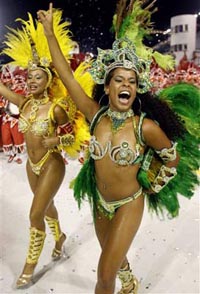Rio wraps up carnival parade with celebration of African roots
Rio de Janeiro ended this year's carnival parade in style Tuesday morning, wowing a capacity crowd of 60,000 revelers with a samba act celebrating Brazil's African roots.

The samba group Beija Flor "hummingbird" in English paraded its float featuring a gilded hummingbird surrounded by leaping impalas, with performers in giant elephant and giraffe suits in addition to the usual elaborately plumed and barely clothed dancers.
Rio's samba parades are the centerpiece of carnival in Brazil. Over the course of two nights, the city's 13 premiere groups mount opulent 80-minute parades involving hundreds of drummers, thousands of dancers and lavish floats.
Each group spends up to US$1 million (EUR760,000) on the parade in an attempt to be declared champion a distinction that brings little more than bragging rights.
Beija Flor was heavily favored to win the coveted championship in voting Wednesday and was declared the popular winner by two local newspapers.
The Porto da Pedra group opened the second night of parading, sending 3,500 dancers into the Sambadromo stadium singing the praises of South Africa and Nobel Peace Prize winner Nelson Mandela.
The parade included a giant float featuring a black-and-white tiger, backed by towering African dolls spinning in place. Behind the float, 250 women in hoop skirts spun like dervishes.
Featured dancer Angela Bismarchi wore body paint and a tiara containing three South African diamonds that the group said required her to be accompanied by 12 security guards.
"It took them eight hours to paint me up like this," Bismarchi said.
During the parade Bismarchi lost G-string. Directors provided her with a thong and she kept dancing, but it could harm the group's chances in the competition, which prohibits nudity.
Carnival is celebrated around the world from Europe to Haiti to New Orleans' Mardi Gras and runs to the start of Lent, the period between Ash Wednesday and Easter observed by Christians as a season of fasting and penitence. Excess and revelry are the point of carnival, which culminates on the aptly named Fat Tuesday.
But Brazil is perhaps unique in the world as a nation of continental proportions where nearly everyone drops everything for four days to celebrate.
In the northeastern city of Salvador, crowds fall in to dance behind giant sound trucks playing Axe music, a calypso-inflected samba.
Further up the coast in the cities of Recife and Olinda, revelers dance the Frevo a high-speed dance performed while holding a multicolored umbrella and the African-inspired Maracatu.
Sao Paulo, Brazil's economic center, has its own glittery parade.
Not everyone approves of the goings-on, though.
Outside the Sambadromo stadium, members of Youth With A Mission played Christian rock music and told passers-by that carnival is the "fruit of sin."
Members of the group, which unites young people from different evangelical churches, spends the four days of carnival handing out religious fliers and wearing green T-shirts emblazoned with the slogan "Smile, Jesus is Happiness."
"We're not against parties, because God invented parties," Youth With A Mission member Esdras Almeida said. "But look what kind of party carnival is all you see is a rise in child prostitution, violence and drug use. With carnival maybe you have fun for three days, but the rest of the year you have nothing."
A growing number of Brazilians share Almeida's view, thanks to the increasing popularity of evangelical churches that now account for about 15 percent of the faithful in this predominantly Roman Catholic country of 180 million people.
Even the Catholic Church, which generally tolerates the festival with its pagan roots and nearly nude dancers, has in the past gone to court to block parade floats that use religious imagery or that it deemed pornographic.
Subscribe to Pravda.Ru Telegram channel, Facebook, RSS!




